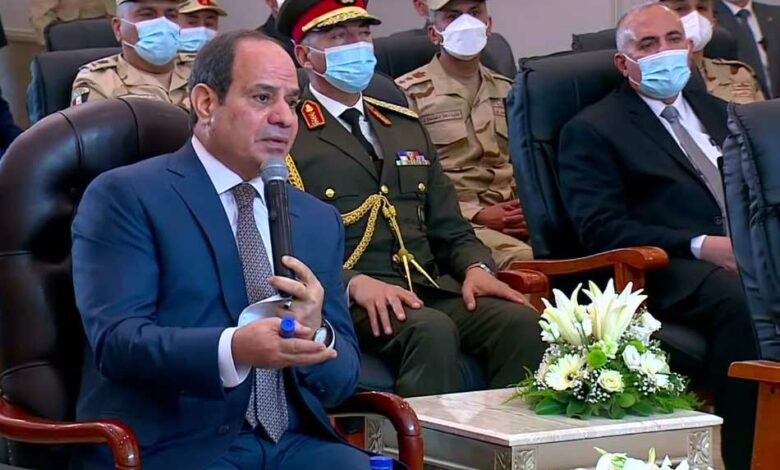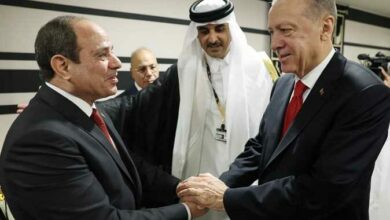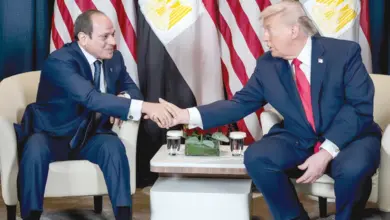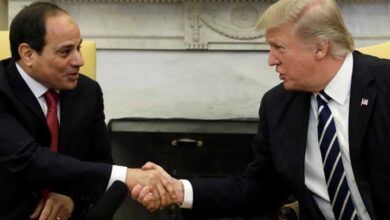
President Abdel Fattah El Sisi said the State aims to keep price levels “without increase”, noting that the State has reserves of strategic commodities that are sufficient for six months.
The president made the remarks during an interview he held with a group of journalists and media men after he inaugurated earlier in the day projects of animal and dairy production, and mechanized slaughterhouses in the industrial city of El Sadat.
Sisi expressed thanks to farmers for supplying nearly 4 million tons of wheat during this harvest season.
“Until the end of the year, we as a State can control prices by other initiatives,” Sisi said, noting that he never talked about the consumption rate of commodities.
President Sisi said Egypt is working very seriously on resolving the Libyan crisis through the constitutional course, the 5+5 talks, and encouraging Libyans to reach an understanding; given that Libya’s interest is much greater than any other interest.
Our stance has been keeping the situation de-escalated, avoiding a slide into an armed confrontation, and bringing things back to how they were in 2019 and 2020, Sisi said.
President Sisi expressed thanks to Saudi Arabia and the UAE, noting that the two countries have moved together to support Egypt without Cairo’s request.
Sisi called on the Arab countries that have deposits in Egypt to convert those deposits into investments, pointing out that Egypt has a lot of projects.
“Egypt’s population is about 100 million and we have promising investment opportunities,” the president added.
Commenting on Egypt’s dealing with the issue of the Grand Ethiopian Renaissance Dam, Sisi stressed that “no one can approach Egypt’s share of the Nile River waters.”
“We are talking diplomatically and we have patience,” Sisi said, noting that at the same time there are a number of projects being implemented to benefit from Egypt’s waters and recycle them more than once in a way that is not applied elsewhere in the world.
As for fuel pricing, President Sisi said there are considerations related to not putting pressure on citizens.
At the same time, the Egyptians have to know that the State’s ability to subsidize fuels that way will cost it a lot, the president noted.
President Sisi asserted that the State is keen to continue supporting the national industry.
In this regard, Sisi said global crises have affected supply chains across the whole world as well as all walks of life, especially industry.
Responding to a question by MENA Board Chairman and Editor-in-Chief Ali Hassan on the possibility of achieving self-sufficiency in a number of strategic commodities, President Sisi said Egypt has already achieved self-sufficiency in some commodities.
However, Sisi said that achieving “absolute self-sufficiency” is something difficult, noting in this regard that 90 percent of the oils used in Egypt are imported.
The president expressed hope that over 2 million feddans of wheat would be added to the current cultivated area in Egypt within the next two years; so that the country can be resilient to surrounding conditions and also generate job opportunities.
President Sisi noted that the national dialogue that has been launched is not controlled by the State, calling on all parties to listen to each other.
He also expressed hope that there would be a common ground for everyone taking part in the dialogue.
President Sisi said the government is working on contracting with experienced companies to manage national infrastructure projects in the country.
As for the Decent Life Presidential Initiative for developing the Egyptian countryside, Sisi expressed hope that the program would be completed in three years.
Commenting on the Russia-Ukraine crisis, the president said it is a difficult and unclear stage for the whole world.
Our relations are good with all countries, Sisi said, affirming that Egypt is adopting a balanced policy in this file.




